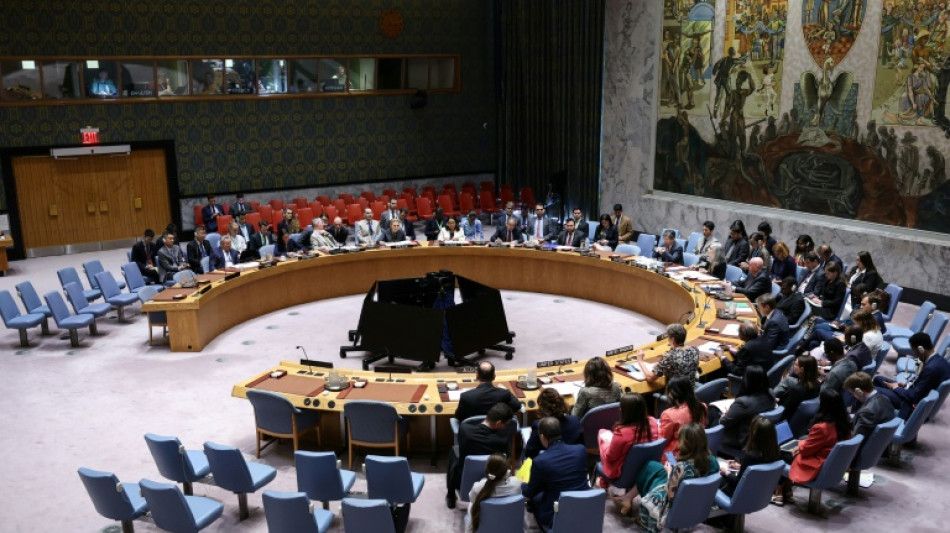

Sweeping UN sanctions return to hit Iran after nuclear talks fail
Widespread UN sanctions against Iran returned into force late Saturday for the first time in a decade, after last-ditch nuclear talks with Western powers failed to produce a breakthrough.
The sanctions, two months after Israel and the United States bombed Iran, bar dealings related to Iran's nuclear and ballistic missiles program but are expected to have wider effects on a troubled economy.
Iran allowed UN inspectors to return to its nuclear sites, but Iranian President Masoud Pezeshkian said the United States had offered only a short reprieve in return for handing over its whole stockpile of enriched uranium, a proposal he described as unacceptable.
An 11th-hour effort by Iran allies Russia and China to postpone the sanctions until April failed to win enough votes in the Security Council on Friday, leading to the measures taking effect at midnight GMT Sunday, or 8 pm in New York.
Germany, which triggered the return of sanctions alongside Britain and France, had "no choice" as Iran was not complying with its obligations, Foreign Minister Johann Wadephul said.
"For us, it is imperative: Iran must never acquire a nuclear weapon," he told the UN General Assembly.
"But let me emphasize: we remain open to negotiations on a new agreement. Diplomacy can and should continue."
Russia made clear it would not enforce the sanctions, considering them invalid.
The sanctions "finally exposed the West's policy of sabotaging the pursuit of constructive solutions in the UN Security Council, as well as its desire to extract unilateral concessions from Tehran through blackmail and pressure," Russian Foreign Minister Sergei Lavrov said.
- No longer just US sanctions -
The sanctions are a "snapback" of measures frozen in 2015 when Iran agreed to major restrictions on its nuclear program under a deal negotiated by former president Barack Obama.
The United States already imposed massive sanctions, including trying to force all countries to shun Iranian oil, when President Donald Trump withdrew from the deal in his first term.
Iran and the United States had held several rounds of Omani-brokered talks earlier this year before they collapsed in June when first Israel and then the United States attacked Iranian nuclear facilities.
US Secretary of State Marco Rubio on Saturday called on UN member states "to implement snapback sanctions immediately in order to pressure Iran's leaders to do what is right for their nation, and best for the safety of the world."
He also urged Tehran to "accept direct talks, held in good faith, without stalling or obfuscation."
Iran recalled its envoys from Britain, France and Germany for consultations on Saturday, state television reported.
"The current (economic) situation was already very difficult, but it's going to get worse," said an Iranian engineer who asked to be identified only by his first name Dariush.
"The impact of the renewed sanctions is already evident: the exchange rate is increasing, and this is leading to higher prices," the 50-year-old told AFP, lamenting a standard of living that is "much lower" than it was "two or three years ago."
The dollar was trading at around 1.12 million rials on the black market on Saturday, a record high according to several currency tracking websites.
An AFP journalist at Tehran's Grand Bazaar saw brisk business at jewelry stores as people rushed to buy gold.
"Most people fear another war because of the snapback," Dariush said.
- Economic 'malaise' -
The United States already enforces unilateral sanctions on Iran and has put huge pressure on third countries to stop buying Iranian oil, although China has defied the pressure.
Brussels-based think tank the International Crisis Group said Iran seemed dismissive of the renewed UN sanctions as it had already worked out how to cope with US sanctions.
But it noted that the snapback was not easy to reverse as it would require consensus at the Security Council.
"It is also likely to compound the malaise around an economy already struggling with high inflation, currency woes and deepening infrastructure problems," it said.
In an address to the UN General Assembly on Friday, Israeli Prime Minister Benjamin Netanyahu urged no delay in reinstating the sanctions.
He also hinted that Israel was ready to take further military action after the 12 days of bombing that Iranian authorities say killed more than 1,000 people in June.
K.Papadimitriou--AN-GR



